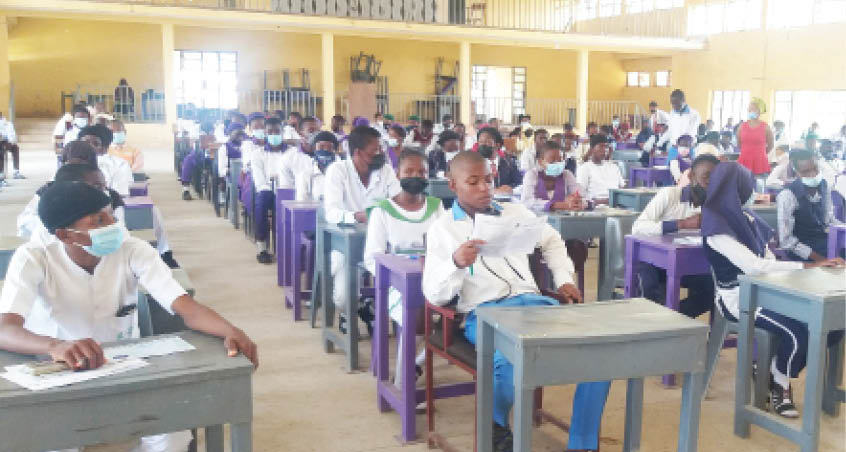Over time, there has been a disproportionate ratio of boys to girls’ involvement in the study of Science, Technology, Engineering and Mathematics (STEM). Though this is fast changing, experts still believe that girls are still lagging in making career choices in these fields.
There are many challenges attributed to the low number of girls studying STEM; experts say teachers are a huge influence on a student’s choice of subject or their decision to pursue a STEM career.
- NIGERIA DAILY: The story behind Ikoyi building collapse
- Death toll from Ikoyi collapsed building rises to 36
According to Oluwabunmi Anani, a teacher with Concordia College Yola, “with respect to STEM, we need more female preponderance because for now, there is a disproportionate ratio of boys to girls’ involvement in STEM.”
“This is owing to certain reasons, including lack of information especially for the girls, absence of motivation and source of inspiration, a skewed assumption that Science and Technology is for the male gender, and fear,” she said.
Anani said the irony is that “if we have more girls in STEM, there will be less retrogression in that area as the female presence would have driven more participation from both genders.”
On why the girl child should participate in STEM, she explained that the world is changing very fast and “if as a girl child, you do not hone the skills to enable you to survive the evolving world through an embrace of STEM, such a girl would not be able to fit into the global world of 2030.”
According to her, the future professions are STEM driven and other jobs are fast running out of relevance. So, if the girl child is left out of the STEM revolution, such would not really be future-ready, and that is no good news.
“We want our girls to be part of the move. Girls, like never before, are needed to drive change, progress and development in their societies and this can be effectively achieved when one is armed with the tools of science and technology,” she said.
“To be relevant as a woman in education, the economy, inventions, discoveries, technology, politics and nation-building, participation in STEM driven activities is a sine qua non,’’ she further stated.
Anani said the girl child should brace up to positively align with STEM; institutions should invest and support STEM in schools; the government should drive support for teachers and make the pursuit of STEM in all schools a priority.
The proprietor of Micray Progressive School, Lokoja, Michael Sule, said for the fact that careers in science, engineering and medicine offer opportunities to advance knowledge, contribute to the well-being of communities, they attract more men than women.
He said many women do not pursue or persist in these careers because of marriage and family responsibility, adding that Africa still has a low value for girl child not because they lack the talent or aspirations, but because they face barriers, including: implicit and explicit bias; sexual harassment; unequal access to funding and resources; pay inequity among others.
He further said there is misplacement of priority and economic problems in most developing countries, including Nigeria, where the government does not often train and retrain STEM teachers.
“Most teachers in the primary and secondary schools are not qualified to teach STEM; there is very poor funding of STEM, insufficient quantities of modern teaching and learning aids, use of irrelevant and obsolete curriculum and poor methods of teaching STEM in schools,” he said.
He noted that there is an urgent need for a total overhauling of STEM in primary and secondary schools.
However, Daily Trust findings show that many students studying science in public secondary schools lack the practical aspects of learning due to the absence of or scarcely equipped science lab.
The students are forced to learn the theory with little exposure to scientific experiments.
During an investigation carried out by Daily Trust early last year, it was discovered that most public schools, especially in the rural areas, do not have functioning laboratories despite teaching science subjects.
One of the teachers in Anagada, FCT, who spoke to Daily Trust under anonymity, said they built a laboratory in the school but it was never furnished with furniture or scientific equipment and since the school did not have a staff room, it was converted to one.
He said the two rooms were occupied by senior and junior staff as staff rooms.
Joyce John, who just graduated from one of the public secondary schools in Nasarawa, said they did not have a good lab and only carried out some practicals in class when their exit examination was approaching.
She said many girls changed to Arts because it was believed that science was a difficult subject, adding that she only finished because she was under pressure from her parents to be in science class.
Reacting to the challenges of studying STEM in public schools, an educationist, Olasunkomi Opeifa, said it had to do with the paucity of instructional materials and the fact that many of the teachers only taught theory.
He said: “The availability of STEM teachers is relative. Personally, I observe that we have more in Biology, followed by Chemistry and very few Chemistry and Math teachers. No matter the situation, we cannot have too many. The standard ratio of STEM teachers to students is not encouraging.
“Effectiveness of instructions in STEM can only be achieved if the lessons are hands-on with enough instructional resources of ratio 1:1. More like it is a special time for extra-curricular activities that are STEM-based. But when there are no learning resources to develop apps, build robots, internet for connectivity and 21st-century inclined teachers to drive learning, all effort is futile,” he said.
Opeifa said girls can be encouraged with the special creation of all-girls STEM clubs, all-girls STEM competitions, all-girls camping programmes etc. With special focus on them, I believe their consciousness will be awakened and more girls around will be encouraged.
“More hands are still needed to come into the field and especially female teachers that can stand as role models to the growing girls,” he added.
Meanwhile, during the International Day of the Girl Child (IDG) with the theme “Digital Generation – Our Generation: Digital Revolution: Not Without Girls” recently, Minister of State for Education Chukwuemeka Nwajiuba said the importance of girls education as well as empowering them with digital skills cannot be overemphasised.
Nwajiuba, who noted that the education of a girl is the education of a nation, said there is the need for all hands to be on deck in ensuring that Nigerian girls achieve irreversible progress towards gender equality through digital learning and offline environment.

 Join Daily Trust WhatsApp Community For Quick Access To News and Happenings Around You.
Join Daily Trust WhatsApp Community For Quick Access To News and Happenings Around You.


